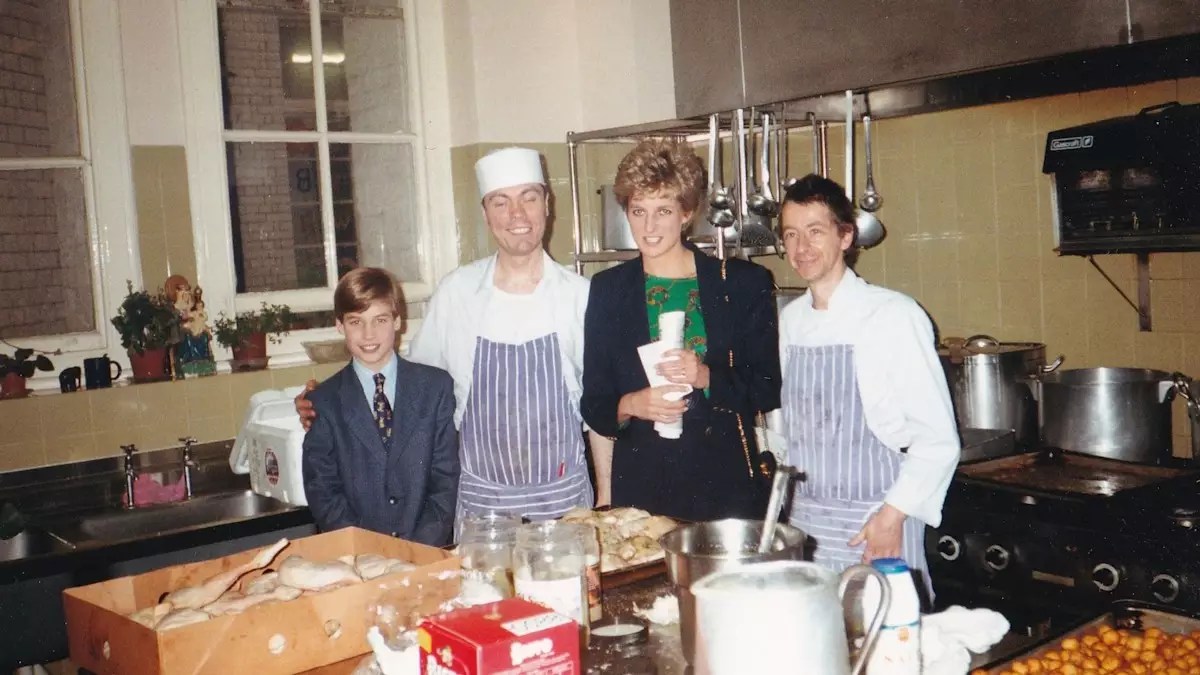Kensington Palace recently unveiled a treasure trove of never-before-seen photographs depicting a young Prince William alongside his mother, Princess Diana, during their visit to a homeless shelter in the early ’90s. These poignant images resurface just before the royal’s highly anticipated documentary titled *Prince William: We Can End Homelessness*, which is set to air on ITV and ITVX. The photographs capture a formative moment in William’s life when he was merely ten years old, engaging in a friendly game of chess with a resident at The Passage homeless shelter. This snapshot not only encapsulates childhood innocence but also mirrors the foundation of empathy that was nurtured by Diana, shaping William’s ongoing commitment to homelessness advocacy.
In a follow-up visit just six months later, William, then eleven, returned to the same shelter with his mother, where he began to understand the complexities associated with homelessness. He recalls these encounters vividly, emphasizing how they triggered a curiosity that became woven into the fabric of his impressionable youth. Diana’s gentle approach to discussing societal inequalities has deeply influenced William’s parenting style as he now extends similar dialogues with his own children about the realities faced by others.
Reflecting on how his mother’s teachings resonate in his current endeavors, Prince William articulated his desire to leverage his royal platform in meaningful ways. He stated, “I’ve slowly tried to work out, what can I bring to the role… I have taken some inspiration and guidance from what my mother did.” His recent initiative, Homewards, encapsulates this ambition. Launched in June 2023, the campaign is a bold five-year approach that aims to eradicate homelessness by focusing on making it “rare, brief, and unrepeated.” This structural vision for change illustrates how deeply ingrained his mother’s influence remains in his commitment to societal reform.
Despite the royal legacy of philanthropy, Prince William’s advocacy represents a contemporary reimagining of his mother’s earlier efforts. His reflections on their shared visits echo the sentiment that understanding the plight of the marginalized was not just an exercise in charity but a fundamental part of being human. He admits that these early experiences prompted a revelation: “There are other people out there who don’t have the same life as you do.”
As William engages more openly with homelessness, he has drawn connections between personal trauma and social responsibility. He humorously speculated what his mother might have thought of his ambitious plans, indicating a delicate balance of legacy and modern urgency. While his mother initiated open conversations about the homeless, William’s approach is layered with the added responsibility of royal stature. He has actively sought to change the narrative surrounding homelessness from a statistic to a human concern.
Integral to the Homewards project is collaboration with a variety of organizations throughout six different UK regions. William’s engagement highlights his commitment to systemic change rather than piecemeal solutions, aiming to be part of the conversation that creates lasting impact.
In an insightful twist, the documentary features William interacting with individuals who have lived through homelessness, such as Fara Williams, a pioneer in women’s football, and television presenter Gail Porter. Through these engagements, William’s candidness fosters an understanding of shared humanity and the potential for recovery and change. The project’s broader narrative stresses that empathy must lead to action, and that means pushing through the limitations that come with privilege.
“I know that sounds weird, but when you feel human connection with somebody who’s been in deep trouble, I challenge anyone not to feel like a desire to help,” William asserts, reflecting on the transformative potential of personal relationships in addressing societal issues.
Prince William’s ongoing commitment to fighting homelessness is a testament not only to his lineage but to a renewed sense of responsibility that acknowledges the acute social issues facing modern society. By leveraging his status as the future King, he is carving out a vital discourse around homelessness—transforming it from a distant statistic into an urgent human concern requiring collaborative action. As we anticipate the release of his documentary, it is clear that William is not just the prince of an era steeped in tradition but a forward-thinking leader addressing one of today’s pressing challenges, honoring his mother’s legacy with every proactive step he takes.







Leave a Reply